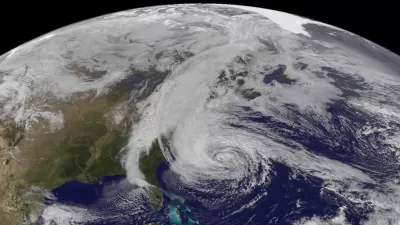World
Global issues, U.N., etc.
New Name Tops List of World's Most Expensive Shopping Streets
Hong Kong has supplanted New York atop Cushman & Wakefield's list of the ten most expensive shopping streets in the world. London's Bond Street fell out of the top ten due to Britain's weak economy.
Peak Oil? 'Far Too Much' Oil to Prevent Severe Climate Change
Confirming an earlier Dept. of Energy report, the International Energy Agency's World Energy Outlook indicates not only that U.S. oil production will surpass Saudi Arabia's by 2020, but that it will be a net exporter by 2030 - thanks to fracking.
Where's Your Happy Place?
Now can you qualify, quantify, and index it? Hazel Borys would like you to do so, and gives this data review to help you get started.
New App Explores Ecological Urbanism
A new interactive app produced by the Harvard Graduate School of Design (GSD) and Second Story Interactive Studios compiles and exhibits examples of "alternative and radical approaches to sustainability at a range of urban scales."

Are Cities a Reflection of their Citizens?
As part of Bloomberg BusinessWeek's "Fix This" city planning series, the World Bank's Daniel Hoornweg considers how cities can often be a reflection of the cultural and institutional personalities of their citizens.

Will the Economics of Climate Change Alter the Politics?
After years of climate change denial by conservatives and muzzling by liberals, Superstorm Sandy made abundantly clear the economic costs of inaction. Will that be enough to spur political action?
Iskandar Malaysia: The Future of Urban Living or Pipe Dream?
Across the strait from Singapore, Iskandar Malaysia is being planned as the world’s next eco mega-city. Its architects and developers hope it will offer an alternative to Asia's polluted cities and a glimpse of the future of urban living.
The 10 Diagrams That Changed Planning
A new exhibit that opened this week at the San Francisco Planning and Urban Research Association's gallery explores the 10 diagrams that have had a monumental influence on urban planning, and the possibilities inherent in the medium.
A Cable Car Comeback
Sophie Landrin looks at the global rise in the use of cable cars - the kind you find on a ski lift and not on the streets of San Francisco - as a transportation alternative. Several French cities are developing plans to become "wired".
Sandy Provides Opportunity for NYC to Lead on Climate Adaptation
As an increasing percentage of the world's population, and economic assets, confront the threats of climate change, the aftermath of Sandy provides an opportunity for New York to set a global example for building stronger, smarter cities.
Building Small is the Next Big Thing
A recent study documents the shift from large-scale units of production to smaller mass-produced units that can be dispersed across many locations. This shift promises to change a host of industries, from transportation to power generation.

Architecture on the Brain
Emily Badger examines the intersection of neuroscience and architecture, an emerging area of study that promises to produce environments that support and enhance our brain function.
Tackling Climate Change Through Density
Increasing mileage standards will do little to measurably reduce greenhouse gas emissions. In order to seriously tackle climate change we need to ditch the cars, and the development patterns they encourage, and move to walkable places.
Low-Cost Solutions Can Bolster Climate Resilience
As we've heard recently, many of the places most vulnerable to rising sea levels and extreme weather are in developing countries. Encouragingly, however, Sandy revealed several low-cost solutions to help mitigate the impacts of severe storms.
New Technology Helps Your Community Prepare for the Next Disaster
Ariel Schwartz explains Recovers, "a logistical management system for disaster recovery," that gives communities tools for matching volunteers with recovery tasks, in the event of a disaster.
Framing Placemaking as a Tool for Achieving a Larger Goal
Nathan Norris continues his series on municipal placemaking mistakes. This time: failure to understand the big picture and its order of operations.
Sandy Changes Political as well as Physical Landscape
NJ's Republican Gov. Chris Christie heaps praise on President Obama, and the governor of the neighboring, hard-hit state, NY Gov. Andrew Cuomo, has also stirred the political pot by going where no other pol has gone - linking Sandy to climate change.
One Government Agency You Don't Second Guess
One silver lining from Hurricane Sandy is that it proved the accuracy of the National Hurricane Center, an agency under the National Oceanic and Atmospheric Administration (NOAA) due largely to its hi-tech tools. Do you know what a 'dropsonde' is?
Lacking Opportunities at Home, New York Architects Export Their Brands
In the face of slow development in the U.S., renowned architects Richard Meier and Robert A.M. Stern have been exporting their distinctive styles overseas, where “people want to bask in the reflective glow of New York.”
Asia's Megacities are Most Vulnerable to Superstorms
A study by the Organisation for Economic Co-operation and Development (OECD) identified twenty coastal cities, which by population, would be most exposed to flooding and superstorms. Fifteen are mega-cities in Asia.
Pagination
Urban Design for Planners 1: Software Tools
This six-course series explores essential urban design concepts using open source software and equips planners with the tools they need to participate fully in the urban design process.
Planning for Universal Design
Learn the tools for implementing Universal Design in planning regulations.
Heyer Gruel & Associates PA
JM Goldson LLC
Custer County Colorado
City of Camden Redevelopment Agency
City of Astoria
Transportation Research & Education Center (TREC) at Portland State University
Camden Redevelopment Agency
City of Claremont
Municipality of Princeton (NJ)


































